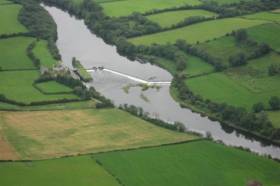Displaying items by tag: Carnroe Weir
Warning Over Low Water Levels on Lower Bann Navigation
Waterways Ireland advises all masters of vessels and users of the Lower Bann that water levels between Carnroe Weir and the The Cutts are currently low due to a technical issue at The Cutts sluice gates, south of Coleraine in Northern Ireland.
Masters of vessels are advised to restrict movements along this section of the Lower Bann navigation until further notice, the cross-border body for Ireland’s inland waterways says.
Waterways Ireland Proposes To Refurbish Carnroe Weir On Lower Bann
Waterways Ireland is proposing extensive refurbishment works to the weir at Carnroe on the Lower Bann between Lough Neagh and Coleraine.
The cross-border body for Ireland’s inland waterways says Carnroe Weir is essential to the retention of water levels and boat movements along the length of the Lower Bann.
Works would be carried out over an 18-month period and in such a manner so as to conserve the heritage value of the current structure and to give a minimum operational life span of 75 years, Waterways Ireland adds.
The main in-river works would be undertaken in the summer months when water levels are typically lower.
In addition, the existing fish pass would be replaced with a new modern pass to comply with the requirements of Northern Ireland’s Department of Agriculture, Environment and Rural Affairs (Daera), which has responsibility for the fishery on the Lower Bann.
Waterways Ireland says it has engaged with consultants to undertake surveys and assessments, as well as consultations with landowners and other stakeholders, with a view to finalise details of the scheme and submit a planning application — including a full Environmental Impact Assessment — by the end of this month.





























































